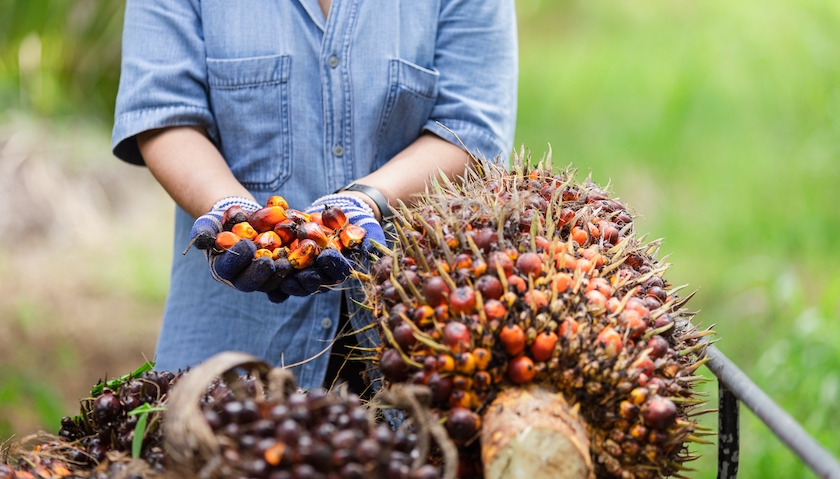Consumers are receiving mixed messages around palm oil with some going as far as encouraging consumer boycotts of any product with palm oil as an ingredient.
But will palm oil boycotts help the environment? The answer is much more complex than a simple yes or no.
“Palm oil itself is not the enemy. Unsustainable production practices are what is causing this environmental and social harm,” said Audrey Tsen, sustainability lab director at research house Synthesis, speaking at a webinar hosted by WWF from Singapore this month.
“Boycotting palm oil is not the solution that will solve these issues. When we substitute palm oil for other vegetable crops, we’re actually in many cases simply moving the problem elsewhere and could actually be exacerbating the very problems they’re trying to solve.
“Palm oil has the highest yields per hectare, up to 10 times more to be exact between four to 10 times worse when compared to any other vegetable oil. This means that if we switch to alternative vegetable crops, we need to clear more land to sustain demands.
“Palm oil is also a major contributor to millions of livelihoods across the globe, including the livelihoods of 4.5 million people in Asia and Malaysia alone. Substituting for other vegetable oil means shifting production in some cases to other countries, leaving those who rely on palm oil agriculture as their only source of income without an alternative livelihood.”

Tsen’s comments come at the same time as the leaders of Indonesia and Malaysia agreed to “fight discrimination against palm oil” and Malaysia said it might stop exporting palm oil to the European Union as a response to a new law there aimed at protecting forests by regulating the sale of the oil across member nations. The EU wants to ban the sale of commodities linked to deforestation unless importers can certify production methods had not damaged forests.
Environmental groups have long blamed the palm oil industry for the widespread destruction of forests in both Indonesia and Malaysia that are home to endangered species of orangutans while also capturing carbon emissions.
‘Baseless allegations’
Addressing a meeting of the Council of Palm Oil Producing Countries (CPOPC), Malaysian commodities minister Fadillah Yusof, who is also the nation’s deputy prime minister, called on member nations to work together to fight the new EU law and rebuff “baseless allegations” from the US and the EU about palm oil’s sustainability.
“If we need to engage experts from overseas to counter whatever move by the EU, we have to do it,” Fadillah told reporters on the sidelines of a seminar, as reported by Reuters.
“Or the option could be we just stop exports to Europe, just focus on other countries if they (the EU) are giving us all a difficult time to export to them.”
EU ambassador to Malaysia Michalis Rokas subsequently told Reuters palm oil imports from Malaysia were not being banned and that the law applies equally to commodities produced in any country, including EU member states “to ensure that commodity production does not drive further deforestation and forest degradation”.
How palm oil became the world’s most hated, most used fat source
According to data from the Malaysian Palm Oil Board, the EU accounts for just 9.4 per cent of the nation’s palm oil exports last year, equivalent to 1.47 million tonnes, and down by 10.5 per cent year on year.
Gabrielle Nelson, assistant manager at the market transformation department for WWF Singapore, who leads the Singapore Alliance for Sustainable Palm Oil, said consumers have been faced with a multitude of mixed messaging around palm oil in the news and through campaigns.

“Often the messaging about sustainable palm oil is being drowned out by the rhetoric on the negative impacts of conventional palm oil production – messaging going so far as to telling consumers to actually boycott the ingredients altogether.”
Activist consumers ‘demanding answers’
Tsen shared research showing activist consumers in multiple international markets are demanding “greater action from brands and governments” on the production of palm oil.
The number of petitions against palm oil on Change.org has grown by 35 per cent over the past decade, and in 2018 and 2019. Consumer pressure is at its peak driven by exposure in global publications and organisations like the New York Times and Greenpeace. The latter publicised that many of the world’s biggest brands “remain engaged in rainforest destruction, due to unsustainable palm oil practices in countries like Indonesia and Malaysia.”
Similarly, petitions initiated by consumers in Asia-Pacific calling for palm oil boycotts also grew over the same period.
“We are also seeing signs that palm oil is not just a niche topic that activists are angry about. Google searches on the topic of palm oil are also steadily rising, showing that mainstream consumer awareness is growing rapidly and globally, such as a boom of more than 40 per cent during the past year.”
The solution: certification
Tsen says the solution is for manufacturers to source sustainable palm oil and certify compliance with environmental requirements.
“When farmers produce palm oil sustainably it has a positive social economic and environmental impact,” she told the webinar. “Great palm oil sustainably helps protect forests and wildlife.”
The Center for Sustainable Palm Oil Studies (CSPO) standard ensures the protection of primary and secondary forests, which are important for biodiversity and the protection of native species.
“Staying silent about sustainable palm oil can actually do more harm than good, because as we know the risks linked to unsustainable palm oil are great, which is why they must ensure that all current and future palm oil production is done sustainably.”
Tsen said brands can demonstrate a sense of personal efficacy, showing consumers that they can make a direct positive impact on the issue through their own actions. But consumers should not feel like they are making a compromise on quality or value.
“The format price and quality of certified palm oil, she said, needs to be on par with – or better than – less sustainable options in order for it to be a compelling choice.”
She advises manufacturers of products containing certified palm oil should leverage the RSPO label to assure consumers about their sourcing standards.
“And, most importantly, always steer clear of greenwashing never mislead or use ambiguous claims that you can back up with action.”
In short: if the industry wants to overcome calls for palm oil boycotts, certified sustainable production is an obvious answer.



